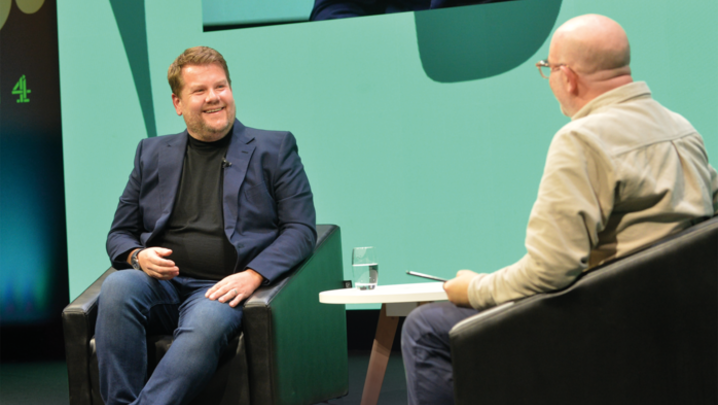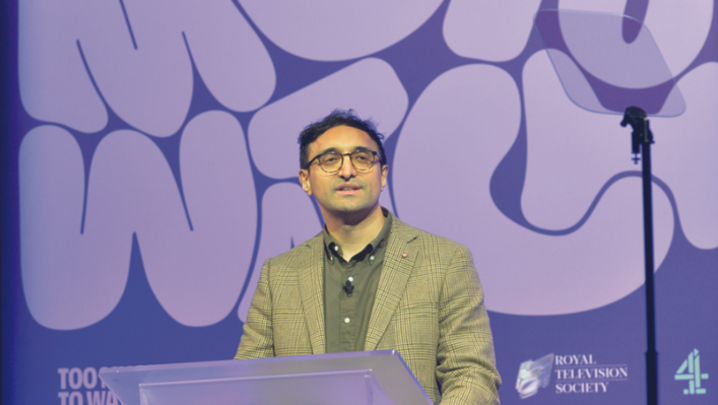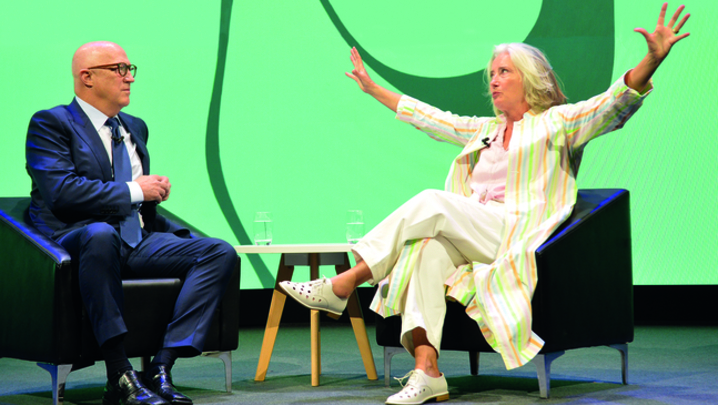How does heart-warming breakout hit Ted Lasso fit into Apple TV+’s content strategy? Shilpa Ganatra reports.
It’s odd to think now but, before kicking off on Apple TV+, you may not have bet on football comedy drama Ted Lasso as a winner.
Originally, Jason Sudeikis’s loveable Mr Nice Guy character fronted a US advertising campaign. As an American football coach turned “head coach of Tottenham Spurs” [sic], his cheerful cluelessness about the beautiful game made him ideal to bring soccer to American culture and thus promote NBC’s Premier League coverage back in 2013.
The mockumentary-style TV and digital skits – packed with gags for newcomers and underlaid with humour for those in the know – paid off for NBC as viewership of its games increased by a remarkable 91%.
Still, when soon-to-be-launched Apple TV+ announced a series of Ted Lasso in October 2019, it wasn’t easy to see how a snackable ad character could translate to a 10-part show.
“They were sketches, and didn’t have depth to them, so when you went into the show you were expecting something throwaway and silly,” says Ben Allen, culture journalist at GQ. “It was only when you watched it that it became clear that they had fleshed it out a huge amount. They put a lot of work into making the main character, Ted Lasso, sympathetic, and they built the cast out nicely as well.”
The audience agreed. Ted Lasso quickly became the streaming service’s flagship show, earning cult acclaim and providing a feel-good destination in lockdown. The show racked up seven of the 11 awards Apple TV+ won at September’s Emmys. The anticipation ahead of its upcoming third series is palpable.
To reboot the premise for TV, Sudeikis and co-creator Brendan Hunt – who plays his pauciloquent sidekick Coach Beard – joined forces with Bill Lawrence, the mastermind behind Scrubs. Lasso and Beard were brought to the fictional AFC Richmond by its owner, Rebecca Welton (Hannah Waddingham), in a secret bid to sabotage the club and take revenge on her football-loving ex-husband. But it doesn’t go as smoothly when Lasso – a likeable, football-loving version of The Simpsons’ Ned Flanders – charms Welton and befriends the team.
They include star player Jamie Tartt (Phil Dunster) and the growly elder statesman Roy Kent (Brett Goldstein, also a writer and producer), plus the WAG with a difference, Keeley Jones (Juno Temple).
The “fish out of water” premise is the crux of its comedy value. “Ted Lasso can take the piss out of tea and call it garbage water, and that’s funny in the US, and even in Britain, where we enjoy self-deprecating humour a bit more than they do over there,” says Allen.
Yet there’s far more to it. The gags come fast and relentlessly, and are highbrow and lowbrow, subtle and slapstick, with moments lobbed in for one side of its transatlantic audience or the other. For the Brits, there’s Phillip Schofield and Holly Willoughby’s cameos, for the Americans, the constant (and apparently hilarious) use of the word “wanker”.
It has heart too, though at times it is “overly sentimental in a way that’s cringe-inducing”, says Allen.
The football itself is less important than the themes around it, such as the camaraderie and devastation that’s ingrained in sport, problematic sponsors, the pressure to perform, and the players’ mental health.
Even with guest appearances from football legends Thierry Henry, Gary Lineker and Peter Crouch, among others, the relationships between the main cast (as well as its stellar supporting actors, such as national treasure Annette Badland, who plays the local pub landlady) elevate the show beyond a football comedy.
A case in point: when Welton’s sabotage is revealed towards the end of the first series, the momentum doesn’t stop – by the second series, it is the players’ and managements’ tangled love lives and personal stories that drive the narrative.
“You think it’s going to be for a specific audience because, on paper, it’s about football, but Ted Lasso feels more like a traditional workplace comedy,” says Allen. “All of the biggest comedies of the past 20 years that I can think of have been workplace comedies, and it’s a riff on that.”
While Apple doesn’t release viewing figures, it did reveal that demand for Ted Lasso’s second season premiere was six times that of the first season. This suggests a word-of-mouth success between seasons that has only grown since.
The series is the platform’s first breakthrough hit, with The Morning Show, starring Jennifer Aniston and Reese Witherspoon, a close second. Also in its catalogue are coveted releases such as M Night Shyamalan’s thriller Servant, and Finch, Tom Hanks’s would-be blockbuster, were it not for the pandemic.
“For me, the most surprising element of Ted Lasso is that it became so popular despite being on a pretty under-watched platform,” says Allen.
In September 2021, Apple reported fewer than 20 million subscribers, a fraction of Netflix’s 200 million. Yet, tellingly, it’s the only big streamer yet to release an Android app, suggesting that its primary goal is neither subscriber numbers nor revenue.
Sean McGuire, MD of media strategy consultancy O&O, explains that the service exists “to keep you in the Apple ecosystem, whether that’s as part of Apple One or by giving it away for free with a piece of hardware”. The latter is how three-quarters of subscribers signed up, according to Antenna, a streaming analytics firm.
As tech companies gear their financial models away from hardware sales towards services (see Sonos as a prime example), Apple One is a key element of Apple’s future. It rolls six products – TV+, Music, Arcade, iCloud+, News+ and Fitness+ – into one monthly plan.
The different approach means it is not trying to compete with the likes of Netflix. You won’t see mainstream favourites in its library – there are no Friends or Father Teds to make sure there’s always something to watch.
“It would be easy for it to bulk up the catalogue by buying libraries, but I think the strategy of focusing on originals is quite interesting because it means there’s always something fresh. And by having only originals, Apple knows that it has got them for ever: it is not going have to do another deal in three years’ time,” explains McGuire.
Estimates from research firm Digital TV Research commissioned by The Hollywood Reporter suggests that Apple TV+ is on course to attract 35.6 million subscribers by 2026, far fewer than its predictions for Netflix (270.7 million) and Disney+ (284.2 million).
In deciding to play its own game of less-is-more, the strategy is in keeping with the Apple brand. “Even from the days of the first Apple computer, it was the upstart alternative to IBM. It was for people who were a bit different, who wanted to expand their horizons,” says McGuire. When you apply that to its content, “Apple won’t drown you with it, but there’ll be enough good stuff that you’ll want to keep it.
“And it’s early days. It is still learning about what works and what doesn’t. For example, they’ve made some interesting moves in sci-fi with For All Mankind and Foundation, although they also released Invasion, which I’m not sure quite hit the mark. But that’s part of learning the game.”
Over time, Apple “will spend to a level that it thinks is necessary to keep that catalogue refreshed, and it will increase that budget when it taps into something that becomes almost bigger than the service, such as Ted Lasso. I think it will keep to this slightly different, Apple-like trajectory.”
And what of Ted Lasso? The creative team had planned for the third series to be its last, but it’s still to be confirmed whether the final whistle is being blown – its runaway success could take it into extra time.







